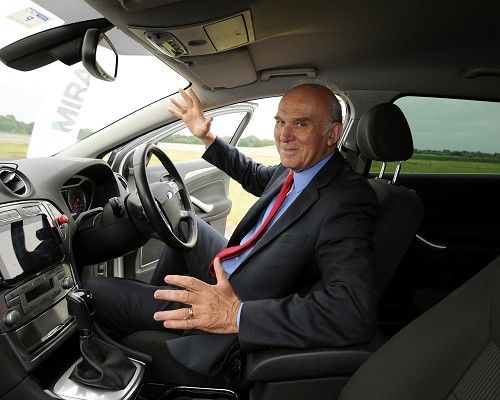

The UK Government has launched the first official trials of driverless cars which could, eventually, save motorists six working weeks a year in driving time.
A government review has revealed there is no legal barrier to the testing of automated vehicles on public roads. With the project being given the green light, Transport Minister Claire Perry and Business Secretary Vince Cable are today at Greenwich in south London to see some of the vehicles which will be used in the trials.
But it could be some years before driverless cars are a feature on the roads. First, the government will publish a code of practice this spring for those wishing to test driverless vehicles on UK roads. Then it will be summer 2017 before domestic regulations are reviewed and amended to accommodate the new technology.
And it will not be until the end of 2018 that international regulations are likely to be amended. The domestic changes could see alterations to the MOT test and also a possible revision of the Highway Code.
The government has also said there needs to be greater certainty around criminal and civil liability in the event of a driverless vehicle being in a collision.
In addition, the government will consider whether a higher standard of "driving" should be demanded of automated vehicles than would be expected of a conventional driver.
Ms Perry admitted the project was "still in the early days" but said the new technology had the potential to be "a real game-changer".
The average driver in England spends 235 hours driving every year - the equivalent of six working weeks. The new technology will mean drivers will be able to choose whether they want to be in control or hand the task of driving over to the vehicle itself.
This would let motorists get on with other things while the car did the driving.
Greenwich is one of three driverless car project centres funded by £19 million of government money. The other projects are at Bristol and in the Midlands where teams at Coventry and Milton Keynes are jointly involved in trials.
Greenwich today will see the first trial of an autonomous shuttle and the unveiling of the prototype of a driverless pod that will be tested in public areas in Milton Keynes.
The two ministers will also see a BAE Wildcat vehicle developed by aerospace company BAE Systems, which will be trialled in Bristol.
For the purposes of the trials driverless cars will still have a fully-qualified driver ready to take over active control if necessary.
Ms Perry said: "Driverless cars are the future. I want Britain to be at the forefront of this exciting new development, to embrace a technology that could transform our roads and open up a brand new route for global investment.
"These are still early days but today is an important step. The trials present a fantastic opportunity for this country to take a lead internationally in the development of this new technology."
Mr Cable said: "The UK is at the cutting edge of automotive technology - from the all-electric cars built in Sunderland, to the Formula One expertise in the Midlands.
"It's important for jobs, growth and society that we keep at the forefront of innovation, that's why I launched a competition to research and develop driverless cars. The projects we are now funding will help to ensure we are world-leaders in this field and able to benefit from what is expected to be a £900 billion industry by 2025."
He added: "The Government's industrial strategy is backing the automotive sector as it goes from strength to strength. We are giving business the confidence to invest over the long term and developing cutting-edge technology that will create high-skilled jobs."
RAC Foundation director Professor Stephen Glaister said: "These trials are not just about harnessing technology to make our travelling lives easier and safer, they also involve getting the regulation right.
"Alongside the high-tech innovation you need policy decisions on long-term, low-tech matters such as who takes responsibility if things go wrong. As and when these vehicles become common place there is likely to be a shift from personal to product liability and that is a whole new ball game for insurers and manufacturers."
AA president Edmund King said: "'Driverless' car technology offers major benefits for making driving safer, easier and more efficient. However, the concept of handing control to a machine is so alien to many drivers that they will take a lot of convincing before they trust and accept it. Ironically, the term 'driverless' may be the biggest psychological obstacle.
"Many aspects of 'driverless' vehicles will help drivers. The technology may assist people to park, avoid collisions, speed up their reactions, and make their drive smoother and easier.
"The driving ability of older drivers and disabled drivers may be vastly improved and make them safer. Perhaps even, in the long run, it will become the norm to hand over control to the car in certain conditions."
"However, there is still the fundamental question: if there is an accident when the car is in driverless or assisted mode, who is liable? Until that key concern is clarified, probably by statute, many drivers will remain wary of 'driverless' driving. Today's government review moves the process of determining liability further forward but has yet to provide a full answer.
"So far, AA members remain sceptical - in July, 65% of them said they did not expect there to be fully automated cars on the road by 2040 at the earliest, if ever."
Comments
Comments on this story express the views of the commentator only, not Bailiwick Publishing. We are unable to guarantee the accuracy of any of those comments.